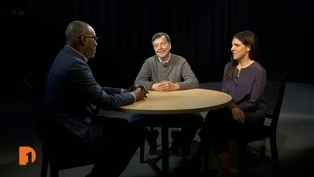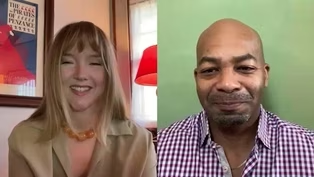
Caregiving: Legal planning for the future
Clip: Season 10 Episode 20 | 8m 17sVideo has Closed Captions
Discussing caregiving and planning for the future with an attorney and a mother and daughter.
We’re continuing our series of reports on caregiving with a look at conversations that should take place between caregivers and their loved ones dealing with finances and legal documents. One Detroit contributor Marty Fischhoff spoke with Antonia Harbin of the Elder Law and Advocacy Center. He also sat down with Judy Page and her daughter and caregiver, Ericka Page.
Problems playing video? | Closed Captioning Feedback
Problems playing video? | Closed Captioning Feedback
One Detroit is a local public television program presented by Detroit PBS

Caregiving: Legal planning for the future
Clip: Season 10 Episode 20 | 8m 17sVideo has Closed Captions
We’re continuing our series of reports on caregiving with a look at conversations that should take place between caregivers and their loved ones dealing with finances and legal documents. One Detroit contributor Marty Fischhoff spoke with Antonia Harbin of the Elder Law and Advocacy Center. He also sat down with Judy Page and her daughter and caregiver, Ericka Page.
Problems playing video? | Closed Captioning Feedback
How to Watch One Detroit
One Detroit is available to stream on pbs.org and the free PBS App, available on iPhone, Apple TV, Android TV, Android smartphones, Amazon Fire TV, Amazon Fire Tablet, Roku, Samsung Smart TV, and Vizio.
Providing Support for PBS.org
Learn Moreabout PBS online sponsorship(dramatic music begins) - [Marty] We're at the home of Judy Page.
She's 81 years old and lives in northwest Detroit.
Recently, she and her daughter Erica visited the Elder Law and Advocacy Center to prepare for Judy's future.
Why did you decide it was time to meet with the attorney and talk about your mom's future?
- Her older sister is a year, almost a year older.
Her and my cousins, her daughters, had sat down to talk about her final wishes probably about 10 years ago and had urged us to do the same.
And just, it's a not an easy subject to breach and so just had put it off for a while.
But I saw an email that invited the community to come and learn about estate planning, and wills and trusts, and the like.
And I signed up.
I figured it'd been time enough to put it off.
- Judy, what made you think it was the right time to do this?
- I wanted to leave my daughter the house, and it was trying to proceed with the workings, because I had a stroke and I was not retaining everything that I wanted to retain.
- So you wanted to set down a plan for the family so they would know your wishes for the future?
- Correct.
- [Marty] Erica set up a meeting with Antonia Harbin, an attorney at Elder Law Center, to address sometimes difficult issues.
Antonia first asked to speak to Judy by herself.
Were you surprised when the attorney asked you to leave the room?
- You know, I'm a little protective of her, so I was like, why do I have to leave?
You know, because we do everything together.
Antonia was very warm and welcoming.
So I was able to trust her and know that my mom was in good hands.
And I wanted the attorney to understand that these are her wishes and not mine.
- [Marty] Erica and her mom knew there were documents they needed to sign, but a will was not on their minds.
- Honestly, I hadn't thought about a will.
You think that when you're wealthy, that's when you think about a will.
But talking with Antonia, we realized that yeah, it actually is important.
It really is not, it's more about what happens with the assets that you do have after your demise, 'cause you're dealing with so much when you lose the loved one.
So just one less thing to worry about, and I'm glad we did it.
- [Marty] A recent survey by the University of Michigan Institute for Healthcare Policy and Innovation found that most Michiganders 50 years and older have not taken the necessary steps to prepare for their long-term needs.
Only 25% have designated a durable power of attorney for medical care, and only 24% have identified the people in their lives to serve as their caregivers.
Even among those age 65 and up, only 37% have signed durable power of attorney.
The survey also found that 39% of those 65 and older said they had not talked with family, friends, healthcare providers, or anyone else about their options and wishes for long-term care and caregiving.
That is the kind of planning for the future that Elder Law and Advocacy Center helps clients with, and they discuss the necessary paperwork to make sure those plans are carried out.
Antonia Harbin, Judy Page's attorney at the center explains.
- The Elder Law and Advocacy Center is a division of Neighborhood Legal Services Michigan.
And we do a lot of different type of work there.
We provide free legal services for those who are 60 and older, who live in Wayne County, and their caregivers.
And we do all types of legal services, landlord tenant, probate, we do elder abuse prevention.
We also do life planning, and we help with kinship caregiving, as well as other caregiving.
Those are just to name a few.
And outside of that, I really wanted to tell you about our first Tuesday workshop that's been going on for many years now, and it gives those who are 60 and older the opportunity to get their life planning documents done for free.
- [Marty] The workshops are held by Zoom and by conference call, If clients want to proceed, they fill out forms and then meet with an attorney one-on-one.
When would you say people should start thinking about these life planning documents?
- Well, really 18 years of age or older, but that rarely happens, just because people may not be prepared to have those conversations.
But I would say those conversations should be more immediate because you never know if something will happen or kind of can happen.
So just having them as soon as possible.
- [Marty] There are generally two primary documents that need to be executed.
The financial durable power of attorney gives a designated individual the authority to manage bank accounts, retirement funds, and other assets.
The durable power of attorney for healthcare specifies the kind of treatment a person wants if they are incapacitated, and designates an individual to make decisions according to those stated wishes.
- With the life planning documents, we often say those documents are even more important than those after death, because they control while you're living.
They help you to continue your decision making as you're living.
If something happens, you become incapacitated, unable to give your preferences, give your thoughts about certain things, then someone you've trusted can actually step into your shoes and make those decisions for you.
- [Marty] Antonia says dealing with older adults is something that gives her great satisfaction.
- Really being able to talk to older adults about what their situations are.
They have so much wisdom.
So I enjoy every moment, every time we get to meet, talk.
It's just, it's a great joy for me.
- [Marty] Completing the paperwork, knowing that her wishes will be carried out when the time comes, brought peace to Judy and her daughter.
Now that all the paperwork is signed, sealed, and delivered, how does it make you feel knowing that that's all in place?
- It's comforting that it is all in place and I don't have to worry about it.
And I was glad that it didn't really cost me anything because it was free of charge.
- A burden lifted for sure, because like I said, it nagged me for quite a while to get it done.
And it just, you know, sometimes we make up things in our head like it's just gonna, I don't wanna breach this conversation.
I don't, you know what I mean?
But it's a burden lifted.
But then on the other hand, it also is a kind of a nudge for me to get my own paperwork done, which is a whole nother story.
Now I gotta have the conversation with my children.
- I, at first, was apprehensive, and I'm glad I did it and it was all out of the way now, and I can relax.
Ken Burns and Sarah Botstein Extended Interview
Clip: S10 Ep20 | 19m 36s | Ken Burns and Sarah Botstein on telling the story of “The American Revolution” in their docuseries. (19m 36s)
Tony Award-nominated performer Brandon Victor Dixon is coming to Detroit on November 15
Video has Closed Captions
Clip: S10 Ep20 | 6m 18s | One Detroit spoke with the Grammy Award-winning actor and singer about his creative process and more (6m 18s)
Providing Support for PBS.org
Learn Moreabout PBS online sponsorship
- News and Public Affairs

Top journalists deliver compelling original analysis of the hour's headlines.

- News and Public Affairs

FRONTLINE is investigative journalism that questions, explains and changes our world.












Support for PBS provided by:
One Detroit is a local public television program presented by Detroit PBS

